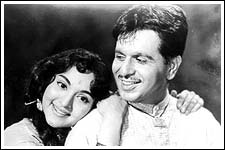
HOME | MOVIES | FEEDBACK |

Dinesh Raheja
A huge blockbuster of the 1960s, Ganga Jamuna deployed several crowd-pleasing elements: daring horseback sequences, song and dance, a nail-biting kabbadi match and, most of all, an enchanting relationship between Dilip Kumar and Vyjayanthimala.
What is also moving about Ganga Jamuna is its tragic irony. It portrays an intensely emotional man whose honesty is under siege and who finally transgresses social norms in his effort to help loved ones. The pathos is immutably etched into this morality drama.
In a feudal village, a religious, principled widow (Leela Chitnis) struggles to raise her two sons Ganga and Jamuna. Devastated when she is framed for a theft, the frail woman passes away. Ganga takes it upon himself to educate his younger brother.
But responsibility sits lightly on the robust Ganga (Dilip Kumar). He enjoys the endless squabbles with his childhood friend-cum-rival Dhanno (Vyjayanthimala), a zesty dhoban [washerwoman]. The sombre Jamuna (Nasir Khan), meanwhile, is in love with the zamindar's to-be-married daughter (Azra).
Despite Dhanno's appearing at his door in the middle of the night (a la Devdas), Ganga refuses to elope with her, burdened by his debt to his brother.
Meanwhile, the zamindar's rapacious brother-in-law (Anwar Hussain) has his eyes on Dhanno. He spots her in a secluded part of the forest, symbolically steps on her clothes and gives pursuit. The entire sequence is screened only with background music. That's why when Ganga appears at the last minute, Dhanno's fiery outburst, "Maar daal [Kill him]" has an added impact.
Ganga's life unravels thereafter. The vengeful Anwar Hussain frames Ganga for theft and he is banished to jail. Here, the famous song Do hanso ka joda bicchad gayo re, picturised on Ganga pacing the narrow confines of his prison cell while a distraught Dhanno is in her home walking within a similar circumscribed space, enhances the mood.
After he is released from jail, Ganga is grief-stricken to learn about Jamuna's --- whom he had sent to the city for studies --- plight from Dhanno. He marches to the haveli, forcibly takes some money (to send to Jamuna) and a gun from the zamindar. Ganga is then hunted down by the villagers until they all flee when the gun accidentally goes off.
Ganga now lives by the gun. With Dhanno by his side, he becomes the leader of a band of desperados. Meanwhile, Jamuna returns from the city as a policeman. Ganga is now caught by loyalties. His willingness to surrender before his brother is countered by Dhanno who can't bear the thought of separation.
Ganga eventually pays for his transgressions. What is poignant is that Ganga's troubles began by a desire to help others. He saves Dhanno but makes an enemy of the zamindar. He steals from the zamindar to help his brother and ends up a dacoit. In the end he tries to save Azra from an undesirable marriage and precipitates the climactic maelstrom.
The supreme irony is that his best intentions for his loved ones too are ill-fated. Ganga gets an empty jewel box home presumably for his beloved mother but this gets her framed. The money he steals doesn't reach Jamuna. He is completely in love with Dhanno, yet when she ridicules his brother, he pushes her away. Unwittingly into the path of a fatal bullet.
Of all the conundrums of human relationships that Ganga Jamuna explores, the most affecting is the one between Ganga and Dhanno --- an extraordinary love story between two ordinary people, handled with great thought and charm. Witness the scene where Ganga is shot by the police and a nervous Dhanno struggles to extricate the bullet. Ganga angrily hits out in pain and a bleeding Dhanno runs away into the forest till Ganga asks for her maafi [forgiveness].
Their characterisation ran so deep, which helped Dilip Kumar and Vyjayanthimala give magnetic performances. Dilip is of course a thespian but Vyjayanthimala is a revelation. Though she won the Best Actress trophy, it is an often undervalued performance.
Director Nitin Bose never lets go of the emotional jugular. But this former cinematographer also frames some excellent shots even while keeping a tight rein on the narrative. In the harrowing chase where Dilip Kumar is hunted down, a panting Ganga pauses to take a drink of water --- and sees his pursuers mirrored therein. Another amazing shot is when the gun goes off and the villagers flee en masse away from Ganga while Dhanno crosses their ranks and flees in the opposite direction, towards him.
Sidelights:
* Ganga Jamuna * This was the fifth major Dilip-Vyjayanthimala classic (after Devdas, Naya Daur, Madhumati and Paigham). But the two stars stopped signing new films for a while, perhaps because Vyjayanthimala was signed for Raj Kapoor's Sangam. * The decision to maintain the dialogue in a dialect of Hindi raised eyebrows but the filmmakers stuck to their guns and the South Indian heroine pulled it off with aplomb. * Nasir Khan, who gave an earnest portrayal as Jamuna in this home production, is Dilip Kumar's brother in real life. Incidentally, he is the father of contemporary actor, Ayub Khan. * Director Nitin Bose was one of the leading lights of Kolkata's creatively fertile New Theatres in the 1930s and 1940s. He had directed famous films like Chandidas, President and Dushman.
The Music:
* Music director Naushad and lyricist Shakeel Badayuni gave the score a folksy inflection that is redolent of a rural atmosphere. * Vyjayanthimala twinkle-toed her way through four of her five Lata songs while Rafi's boisterous Nain lad jaye hai toh gave Dilip Kumar a chance to dance. * Asha's sole song is the Helen mujra with some pretty pointed insults for the villain.
You might also want to read:
|
||
© 1996 - 2002 rediff.com India Limited. All Rights Reserved. |
|||